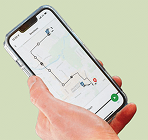Adult Social Care Transport Advice
Getting to and from vehicles
Most passengers make their own way to and from vehicles, either independently or with support from others.
Where this is not possible, drivers and passenger assistants may help people from and to an appropriate door, but are not permitted to enter properties.
For some passengers, it is important that carers are at home in the mornings and afternoons when vehicles arrive. If due to unforeseen circumstances carers are not at home, provisions and transport providers must be contacted as soon as possible to make alternative arrangements.
Drivers and passenger assistants are not responsible for example; checking if people have locked their doors or remembered to bring items with them.
Passengers should be ready to board vehicles at specified times. If not, drivers will leave after a few minutes and continue journeys without them to ensure a timely arrival for other people.
Pick-up and drop-off times
Routes to and from provisions, and pick-up and drop-off times are planned by transport providers to be as efficient as possible for everyone travelling on vehicles.
Because of this, it is not possible to accommodate the individual circumstances of each passenger and their family, such as work or other commitments.
Passengers and their families cannot choose their own pick-up and drop-off times, and should be flexible to suit the transport arrangements provided.
All adult social care routes should be considered as a public transport service.
Transport providers only accommodate normal start and end times of day services, day opportunities and colleges.
Unavoidable changes to pick-up and drop-off times can be unsettling, however these are likely to be an ongoing factor for people using adult social care transport.
Journey durations
Passengers living furthest away from provisions are likely to have longer journey times if picked-up first and dropped-off last.
When compared to travelling in private vehicles, journey times on shared services are likely to be significantly longer. Road congestion also results in longer journeys.
To manage passenger numbers on each vehicle, people may be allocated to routes that do not have the shortest journey durations.
It is recognised that passengers travelling long distances to provisions are likely to have longer journey times.
Shared travel
Adult social care transport is based on shared travel in vehicles with other passengers. Individual transport is not offered.
Boarding correct services
Passengers and their families are given details of transport providers allocated.
Drivers know contract numbers, names, addresses and destinations of those being transported.
Passengers, their families, and provisions can ask to see driver identification.
If vehicles are late
Wait at least 30 minutes before making alternative travel arrangements. Road congestion often causes delays.
Passengers and their families should ensure they have their transport provider contact details in case of an incident.
In the event of incidents such as vehicle breakdowns, drivers determine if passengers should remain on board or leave vehicles.
Passengers should follow driver instructions and must not leave vehicles without permission. Anyone leaving vehicles against driver advice does so at their own risk.
Challenging behaviour
Challenging behaviour should be reported to transport providers in the first instance, who investigate allegations and follow a process to resolve any issues.
Eating and drinking on vehicles is not normally permitted.
Some vehicles have CCTV installed for the safety and security of everyone travelling.
Responsibility for securing people into passenger restraints
This is a joint responsibility of passengers, their families and transport providers for morning journeys. Provision staff will generally help for afternoon journeys.
Drivers are responsible for ensuring all passengers are secure before vehicles depart.
Changes to transport arrangements
Travel arrangements are likely to change multiple times. This includes changes of transport providers, changes to pick-up and drop-off times, changes to journey durations, changes of drivers and passenger assistants, along with other passengers joining and leaving vehicles.
Transport variations are often unavoidable and are made throughout the year in response to changes of requirements.
It is recognised that changes of arrangements can be unsettling, however transport providers work with passengers, their families and provisions to minimise disruption.
Passengers and their families must let adult social care teams know if they are moving home address, as a reassessment of eligibility to transport will be required.
Journeys are provided to and from home addresses only, and transport providers are not required to accommodate alternative locations such as carers or other family members.
Part time attendance
Transport is only provided for the normal start and end times of day services, day opportunities and colleges. Transport does not accommodate part time attendance, and additional trips during the day are not offered.
Special transport requirements
When discussing transport with adult social care teams, passengers and their families should provide all relevant information about their special travel requirements.
Passengers and their families are encouraged to discuss travel requirements and preferences with transport providers, and share techniques to help with journeys.
Provision of passenger assistants
A single passenger assistant is only provided on vehicles, where assessment of an individual passenger or group of passengers has determined a requirement on the grounds of physical or behavioural need.
For passengers with certain medical conditions, adult social care teams may separately arrange for trained carers to travel with them.
Driver and passenger assistant safeguarding checks
Transport providers must ensure all their employees carrying out regulated activity on Essex County Council contracted transport services have been through safeguarding checks.
These include enhanced Disclosure & Barring Service checks, and drivers may already have this as part of their licensing requirement.
All passenger assistants are required to have an enhanced Disclosure & Barring Service check.
We cannot instruct transport providers on the gender of drivers and passenger assistants used.
Adverse weather conditions
During severe weather conditions such as snow, flooding or high winds, transport providers communicate with passengers, their families and provisions if they are unable to operate services.
We support decisions to suspend services where travel would be considered unsafe for passengers, staff or other road users.
Transport providers consider multiple factors when deciding:
Availability of staff; can they travel safely between their homes and vehicle depots
Road conditions along the whole route, including at vehicle depots, all passenger homes and provisions
Pavement conditions for passengers between vehicles and their homes or provisions; including those with mobility issues
Weather forecast for the whole day; if passengers are transported in the morning, are afternoon return journeys likely to be possible
Minibuses are often rear wheel drive, and do not handle snow as well as front or all-wheel drive vehicles
If transport is no longer required
People may move to different provisions or home addresses, and adult social care transport is no longer necessary.
Passengers and their families are under no obligation to use the transport offered, and may wish to make alternative travel arrangements at their own cost.
Contact the Integrated Passenger Transport Unit to inform us if transport is no longer required.
Integrated Passenger Transport Unit
Telephone: 0345 603 2200
Complain about adult social care transport
Passengers, their families and provisions should contact transport providers directly to share feedback about the quality of their services.
For issues that remain unresolved, please let us know by using our complaints and compliments form.




